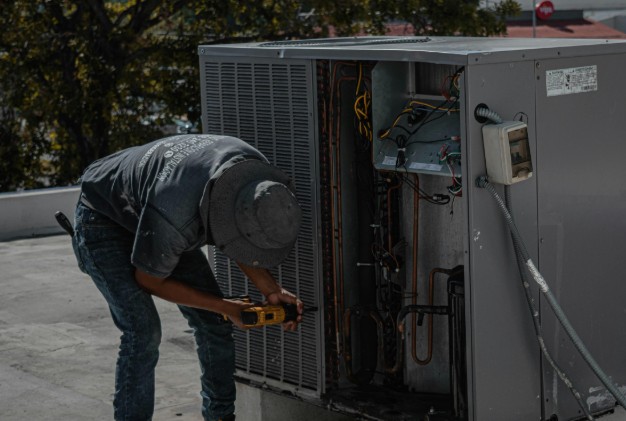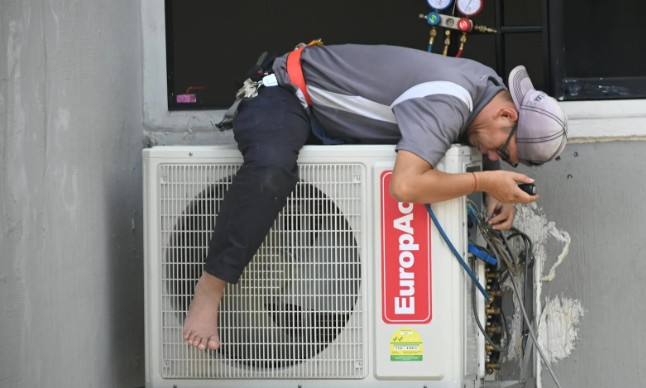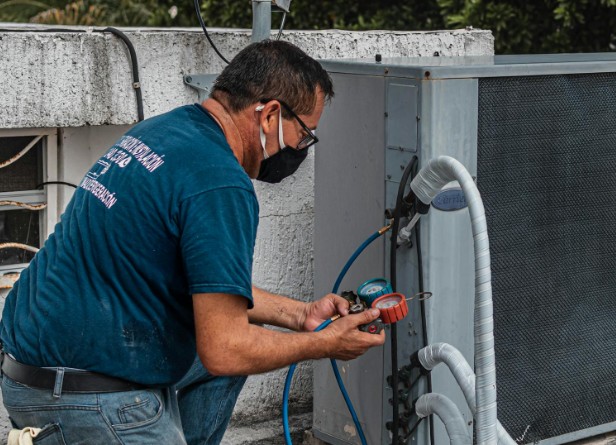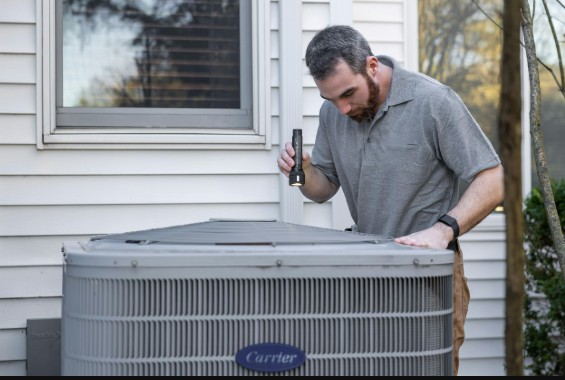Your HVAC system works hard to keep your home comfortable, but regular maintenance is key to avoiding costly repairs and extending its lifespan. Routine care can help your system last 15-20 years, compared to 10-12 years for neglected units. This guide covers simple DIY maintenance tips and when to call in professionals, helping you save on energy bills and prevent major issues.
The Financial and Comfort Benefits of Regular HVAC Care
Enhanced Energy Efficiency
A clean, well-maintained HVAC system operates more efficiently than one that’s been neglected. When filters are clogged and coils are dirty, your system has to work harder to achieve the same level of comfort. This extra strain can increase energy consumption by 15-25%, directly impacting your monthly utility bills.

Regular maintenance ensures all components function optimally. Clean filters allow proper airflow, while spotless coils facilitate better heat transfer. These small improvements compound over time, resulting in noticeable energy savings throughout the year.
Extended Equipment Lifespan
HVAC systems represent a significant investment—typically ranging from $5,000 to $15,000 for complete replacement. Regular maintenance helps protect this investment by preventing premature wear and tear on critical components.
Well-maintained systems experience less stress during operation. Motors run smoother when properly lubricated, belts last longer when properly tensioned, and electrical connections remain secure when regularly inspected. This reduced wear translates to fewer breakdowns and a longer operational life for your entire system.
Improved Indoor Air Quality
Your HVAC system doesn’t just control temperature—it’s also responsible for circulating and filtering the air throughout your home. Clean filters and ductwork help remove dust, pollen, and other airborne contaminants that can affect your family’s health and comfort.
Regular maintenance includes checking and cleaning air ducts, replacing filters, and ensuring proper ventilation. These steps help maintain healthy indoor air quality, which is especially important for family members with allergies or respiratory conditions.
Common HVAC Problems That Maintenance Prevents
Understanding potential issues helps you appreciate why routine maintenance matters. Many costly repairs stem from problems that regular upkeep could have prevented.
Clogged Air Filters
Dirty filters are among the most common HVAC problems, yet they’re easily preventable. When filters become clogged with dust and debris, airflow restrictions force your system to work harder. This leads to increased energy consumption, reduced comfort, and potential damage to other system components.
Dirty Evaporator and Condenser Coils
Over time, both indoor evaporator coils and outdoor condenser coils accumulate dirt and debris. Dirty coils reduce heat transfer efficiency, causing your system to run longer cycles to achieve desired temperatures. This increased runtime accelerates wear on all system components.
Refrigerant Leaks
Low refrigerant levels, often caused by small leaks, significantly impact cooling performance. Your air conditioner will struggle to remove heat effectively, leading to longer run times and higher energy bills. Refrigerant leaks also cause uneven cooling throughout your home.
Electrical Issues
Loose connections, worn contacts, and corroded wires can cause system failures or safety hazards. These problems often develop gradually, making them difficult to notice until they cause significant issues.
Simple DIY Maintenance Tasks Every Homeowner Can Handle
You don’t need professional training to perform basic HVAC maintenance. These simple tasks can make a significant difference in your system’s performance and longevity.
Monthly Filter Replacement

Check your air filter monthly and replace it when it appears dirty or clogged. Most standard filters need replacement every 1-3 months, depending on usage and environmental factors. Mark your calendar or set phone reminders to stay consistent with this crucial task.
Keep Outdoor Units Clear
Your outdoor condenser unit needs adequate airflow to function properly. Remove leaves, grass clippings, and other debris from around the unit. Trim vegetation to maintain at least two feet of clearance on all sides.
Clean Vents and Registers
Vacuum dust and debris from supply and return vents throughout your home. Remove vent covers periodically for deeper cleaning. Ensure furniture, curtains, or other items aren’t blocking airflow from these openings.
Check Thermostat Operation
Test your thermostat regularly to ensure it’s responding correctly to temperature changes. Clean the unit gently with a soft brush or cloth, and replace batteries if applicable. Consider upgrading to a programmable thermostat for better efficiency and convenience.
When Professional Help Becomes Necessary
While DIY maintenance handles many routine tasks, certain situations require professional expertise. Recognizing these scenarios helps you avoid attempting repairs that could damage your system or void warranties.
Refrigerant Issues
Handling refrigerant requires specialized equipment and EPA certification. If your system isn’t cooling properly despite clean filters and clear coils, contact a professional to check refrigerant levels and identify potential leaks.
Electrical Problems
Any electrical issues beyond basic thermostat battery replacement should be handled by qualified technicians. Signs of electrical problems include frequent circuit breaker trips, burning odors, or unusual sounds from the unit.
Complex Mechanical Repairs
Motor replacements, compressor issues, and ductwork modifications require professional skills and tools. Attempting these repairs yourself could result in injury or expensive damage to your system.
For comprehensive system evaluation, consider annual professional inspections. These typically include services like air conditioning repairs, like those offered in Herriman, ensuring your system receives expert attention when needed.
Selecting the Right HVAC Technician

When professional service becomes necessary, choosing the right technician protects your investment and ensures quality work.
Verify Licensing and Insurance
Always confirm that any HVAC contractor holds proper licensing for your state and carries adequate insurance coverage. This protects you from liability and ensures the technician meets professional standards.
Check References and Reviews
Research potential contractors through online reviews, Better Business Bureau ratings, and references from recent customers. Pay attention to comments about punctuality, work quality, and pricing transparency.
Get Multiple Estimates
For major repairs or system replacement, obtain estimates from at least three different contractors. Compare not just prices, but also the scope of work, warranty coverage, and timeline for completion.
Also Read: Why Must Fire Extinguishers Be Routinely Maintained?
Seasonal Maintenance Checklist for Year-Round Performance
Different seasons place varying demands on your HVAC system. Following a seasonal maintenance schedule ensures your system stays prepared for changing weather conditions.
Spring Preparation
Replace air filters and schedule professional inspection of cooling components. Clean outdoor condenser coils and check refrigerant levels. Test thermostat operation and calibrate if necessary.
Summer Monitoring
Check filters monthly during peak cooling season. Keep outdoor units clear of debris and ensure adequate clearance around equipment. Monitor energy bills for unusual increases that might indicate developing problems.
Fall Transition
Replace filters and inspect heating components before cold weather arrives. Check and clean ductwork if accessible. Test heating system operation and address any issues before you need reliable heat.
Winter Maintenance
Continue monthly filter changes and keep outdoor units clear of snow and ice. Check for drafts around windows and doors that force your heating system to work harder. Monitor system performance throughout the heating season.
Conclusion
Regular HVAC maintenance boosts comfort, reduces long-term costs, and ensures energy efficiency. Simple tasks like replacing filters and cleaning outdoor units, combined with annual professional inspections, help prevent expensive repairs. A well-maintained system keeps your home comfortable year-round and lowers utility bills.




